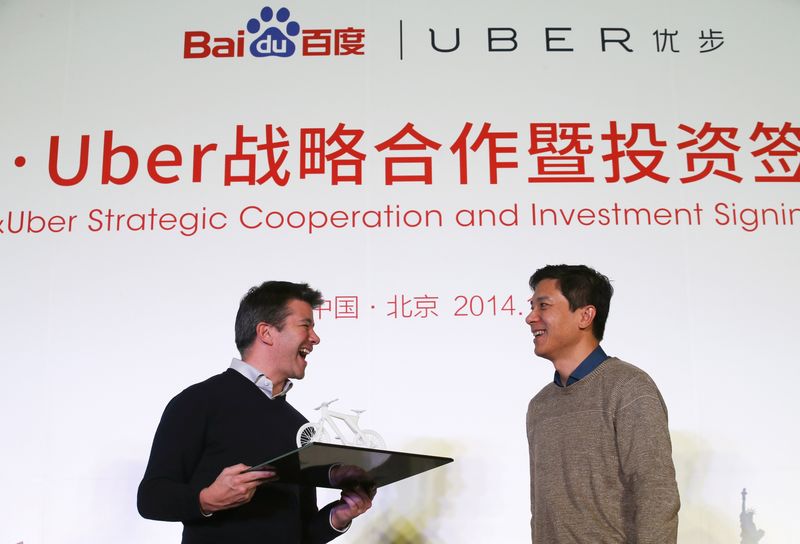By Gerry Shih and Adam Jourdan
BEIJING/SHANGHAI (Reuters) - Deep-pocketed Chinese rivals and tough regulators stand in the way of U.S. car-hailing service Uber's plans to conquer one of the world's biggest transportation markets, even after it signed a tieup with domestic internet giant Baidu Inc.
The terms of a deal that sees Baidu buy a stake in the fast-growing taxi app operator were not disclosed.
Uber, though, is a comparative latecomer in China, where taxi app users are set to triple to 45 million by 2015 compared with 2013, according to Chinese research firm iResearch. Domestic firm Kuaidi Dache and Didi Dache, backed by tech giants Alibaba Group Holding Ltd and Tencent Holdings Ltd respectively, have 90 percent of the market sewn up.
"China is the Holy Grail because it is both elusive and attractive at the same time," said Kumar Saha, an automotive and transport analyst at Frost & Sullivan.
Uber does have a presence in mainland China already, but it's tiny, with operations in just eight cities. By contrast, Kuaidi is already in over 350 cities, while rival Didi recently raised $700 million to fund expansion.
"You have to do things differently in order to succeed here in China," Uber Chief Executive Travis Kalanick said in Beijing, making his first public appearance since a rape case involving a driver in India that resulted in an Uber ban in New Delhi. Kalanick declined to discuss the India situation or its impact on company policy in other markets like China.
Baidu is the latest big-name investor in Uber, joining the likes of Goldman Sachs and Google Inc, to place a bet on the fast-growing transportation company, now valued at a hefty $40 billion. But Uber's aggressive growth has already been accompanied by negative publicity over some of its business practices and bans in some countries.
Shanghai-based drivers for the firm's affordable-end 'People's Uber' business, which dubs itself a non-profit ridesharing service, told Reuters the firm paid them around double the drive fare to lure in more drivers and help boost market share.
Uber officials in China did not respond to questions on these subsidy payments.
Kalanick said the firm was not facing any "pressing regulatory issues" in China, but analysts warned domestic regulation would be a steep hurdle.
"Any fault in complying with law will be damaging. With or without these incidents, the government will exert their control," said Klaus Paur, global head of automotive at Ipsos.
Baidu's investment may help smooth the process, analysts said. But Kuaidi and Didi already have long-standing ties with regulators and Uber's "outsider" status will be hard to change.
"They are using this disruptor positioning. We use the collaborator positioning with government," Joe Lee, co-founder of Kuaidi, told Reuters.
Uber's first challenge, though, is simply to hook in consumers in an already-crowded taxi app market.
"I use apps almost every time I need a taxi," said Lucy Zheng, a 25-year-old graphic designer from the eastern city of Hangzhou. "Uber? I've heard about it, but never used it."

(Additional reporting by SHANGHAI newsroom; Editing by Kenneth Maxwell)